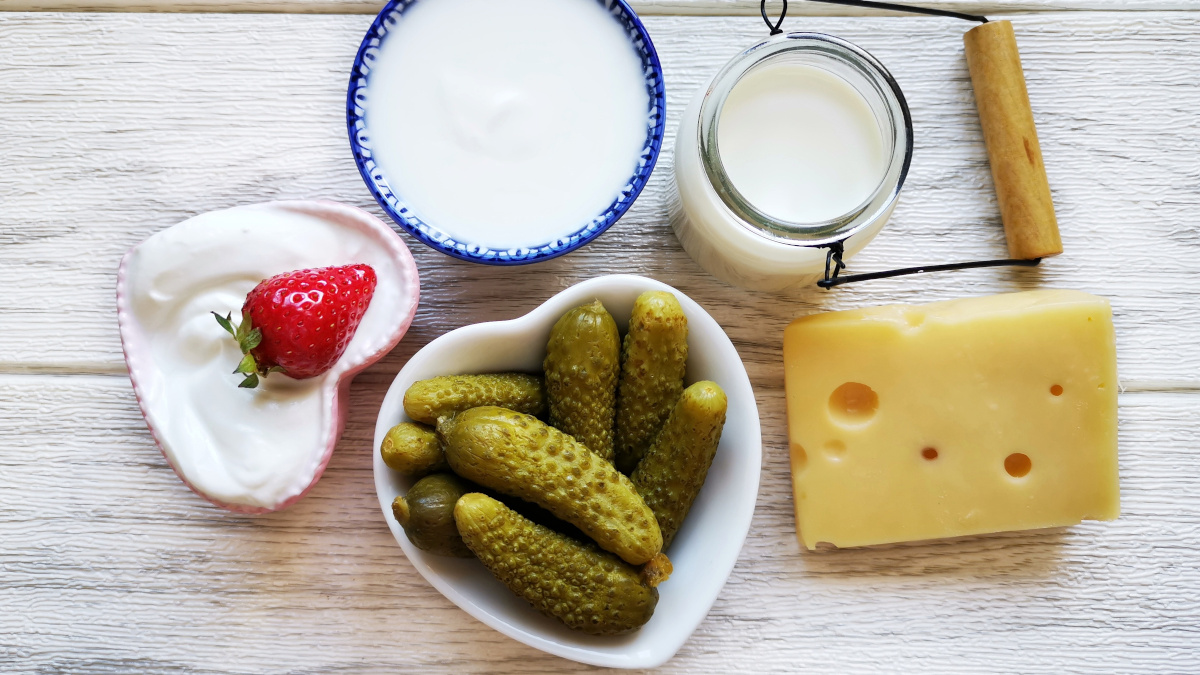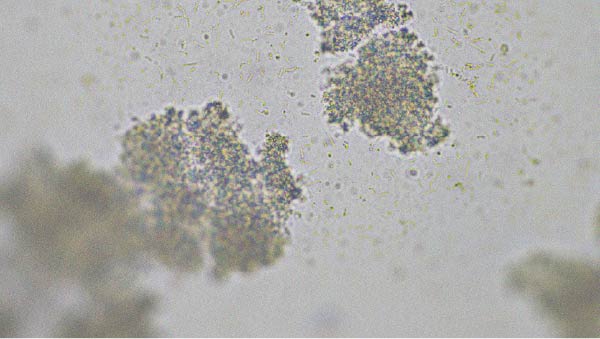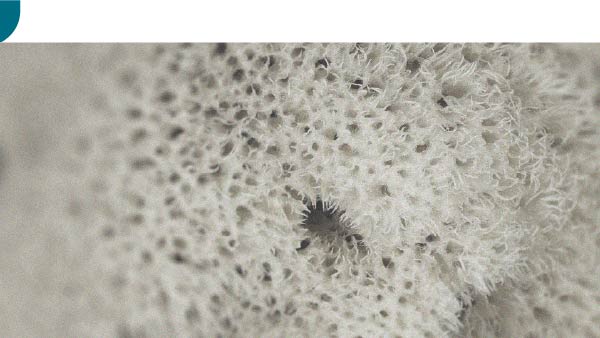In which foods are probiotics and prebiotics found?
Want to pack your meals full of probiotics and prebiotics? We give you the lowdown on the best foods to choose.

Microbiota, probiotic, prebiotic… what are we actually talking about?
Our gastrointestinal tracts are populated with approximately 100,000 billion live microorganisms primarily comprising bacteria, fungi and yeasts (1). This vast community is called the intestinal microbiota – previously known as the intestinal flora. It is concentrated mainly in the small intestine and the colon, the stomach’s acidity creating an environment that’s too hostile for its development.
A balanced microbiota, with a diverse range of flora rich in beneficial bacteria, is considered a vector of good health. The microbiota is involved in digestion, metabolism and immunity, and may also have a direct link to the nervous system, which is why it is sometimes called the ‘second brain’ (2-4).
It’s therefore important to treat your microbiota well by introducing friendly bacteria into your digestive system. There are two complementary ways of achieving this:
- ingest these microorganisms directly in the form of probiotics. The most widely-studied of these include Bifidobacterium and Lactobacillus bacteria, as well as Saccharomyces yeasts;
- stimulate the growth of good bacteria by nourishing them with the right compounds - prebiotics.
Dairy products, packed with lactic bacteria
Yogurt, produced using a culture of lactic bacteria (typically Streptococcus thermophilus and Lactobacillus bulgaricus, as well as Bifidobacterium for those containing bifidus), delivers a welcome shot of probiotics at the end of a meal (5). Opt for classic natural farm yogurt over highly-processed products (such as fruit varieties).
How about cheese? Certain aged varieties or those made with unpasteurised milk are notable for their high probiotic content, such as gouda, mozzarella, cheddar, gruyere and Roquefort (6). Lighter options, such as fromage blanc and cottage cheese, are good alternatives.
Fermented drinks, allies of a healthy microbiota
For a sparkling drink that’s rich in natural probiotics, fermented beverages offer a healthy alternative to fizzy pop.
Consumed in the Caucasus since antiquity, kefir is made from the fermentation of animal milk activated by kefir seeds, a combination of lactic bacteria and yeasts (7). It is also available as fruit kefir, with a base of fruit juice, sugar and spices.
Very popular in Asia, kombucha is produced from a curious fungus of the same name (it’s actually a symbiotic colony of bacteria and yeast known as SCOBY) introduced into tea and sugar (8). The result is a fizzy, acidic and slightly alcoholic beverage.
Lacto-fermented vegetables, probiotics in jars
Sauerkraut, kimchi, cornichons, pickles … All these vegetables have undergone lacto-fermentation. This preserving process is based on the conversion of carbohydrates into lactic acid by the lactic bacteria in foods. This reaction gives them their distinctive acidity.
Apart from protecting food from pathogenic organisms, lactic fermentation provides an easy way of boosting your intake of probiotics (9). There’s no need to consume a large amount: 1-2 tbsps a day is sufficient.
Fermented soya, Asia’s microbiotic star
Used in all Asian cuisine sauces, where they deliver the exquisite taste of umami, fermented soya products also contain a wealth of probiotics (10).
In Indonesia, meat can be easily substituted by tempeh (hulled soya beans fermented by Rhizopus oligosporus mould). Miso, a fermented paste made from soya, rice and barley, is added to Japanese soups at the last minute. And soy sauce is great for zhuzhing up marinades (but use it sparingly as it’s very salty!)
Brewer’s yeast, the flora-friendly fungus
Brewer’s yeast contains a microscopic fungus called Saccharomyces cerevisiae. Used in the production of beer, its inactive form is available as flakes for sprinkling on food or drinks. Apart from its probiotic content, it also contains a number of B group vitamins, proteins and various trace-elements (chromium, selenium…) (11).
Fibre, an essential source of prebiotics
To proliferate effectively, good bacteria need to be fed! Dietary fibre, which does not cross the intestinal wall, is a form of non-digestible sugar which ferments in the gut and supports the growth of beneficial microorganisms.
This valuable source of prebiotics is primarily found in the plant kingdom. Good fruit and vegetable sources include asparagus, garlic, onions, leeks, artichokes and bananas (12). A vegetable that’s often overlooked, chicory is also well worth adding to the menu for its inulin content, a fructan-type fibre. Last but not least, fibre-containing pulses and whole grains should also feature prominently in your diet.
A word of advice: if you’re not used to eating this much fibre, increase your intake very gradually to prevent intestinal discomfort.
Microbiotic supplements to optimise your intake
You also have the option of boosting your daily intake of microorganisms by taking supplements targeted at the microbiota. The following all provide excellent microbiotic support.
Lactobacillus gasseri
One of the best-known strains, scientifically studied since the 1980s, Lactobacillus gasseri is a type of lactic bacteria naturally present in breast milk. Many studies have examined how it interacts with human metabolism (13-14).
To obtain maximum benefit, choose an adequately-dosed supplement in a form that withstands stomach acidity (such as Lactobacillus gasseri, gastro-resistant capsules that provide 12 billion microorganisms a day).
Colon Friendly
As each strain has its own sphere of activity, certain microbiotic formulations combine several microorganisms designed to colonise different areas of the digestive tract. For example, Lactobacillus acidophilus is concentrated in oral and digestive mucous membranes, while Saccharomyces cerevisiae has a particular affinity for the lower gastrointestinal tract.
That’s why they’re combined in innovative and powerfully synergistic supplements (such as Colon Friendly, a formulation containing the four well-known strains Saccharomyces cerevisiae, Bifidobacterium longum infantis, Bifidobacterium longum longum and Lactobacillus acidophilus) (15-16).
H. Pylori Fight
Unfortunately, not all strains of bacteria are friendly. A case in point is Helicobacter pylori, one of the few strains able to withstand the acid environment of the stomach, often responsible for heartburn and stomach ulcers (17).
A number of studies have investigated the interaction between beneficial and pathogenic bacteria. Equipped with adhesion molecules capable of co-aggregating to H. pylori, the inactivated DMS 17648 strain of Lactobacillus reuteri (which features in the patented supplement H. Pylori Fight) offers particular promise (18-19).
Probio Forte
When it comes to microbiotic supplements, the method of manufacture is key. It governs how the probiotics are placed in a state of dormancy. The most common method, atomisation, involves significant exposure to stress, which inevitably means some of the microorganisms will not survive (20).
Though more expensive, freeze-drying provides the microorganisms with more stability on their journey to the gastrointestinal tract (the supplement Probio Forte, combining 3 lactobacilli with Bifidobacterium lactis and Lactococcus lactis, uses this cutting-edge method).
Lactobacillus Plantarum PostBiotic
Have you come across postbiotics? Unlike classic probiotics, these contain microorganisms inactivated by heat treatment to remove their inhibitors, thus maximising their effect.
Discovered in narezushi, a type of fermented sushi, the Lactobacillus plantarum strain L-137 makes such effective use of this heat inactivation that it is regarded as the no. 1 immunobiotic (it can be found in the innovative microbiotic supplement Lactobacillus Plantarum PostBiotic, supported by several clinical studies) (21-22).
References
- Thursby E, Juge N. Introduction to the human gut microbiota. Biochem J. 2017;474(11):1823-1836. Published 2017 May 16. doi:10.1042/BCJ20160510
- Rowland I, Gibson G, Heinken A, et al. Gut microbiota functions: metabolism of nutrients and other food components. Eur J Nutr. 2018;57(1):1-24. doi:10.1007/s00394-017-1445-8
- Zheng D, Liwinski T, Elinav E. Interaction between microbiota and immunity in health and disease. Cell Res. 2020;30(6):492-506. doi:10.1038/s41422-020-0332-7
- Petra, Anastasia I et al. “Gut-Microbiota-Brain Axis and Its Effect on Neuropsychiatric Disorders With Suspected Immune Dysregulation.” Clinical therapeutics 37,5 (2015): 984-95. doi:10.1016/j.clinthera.2015.04.002
- Elli M, Callegari ML, Ferrari S, et al. Survival of yogurt bacteria in the human gut. Appl Environ Microbiol. 2006;72(7):5113-5117. doi:10.1128/AEM.02950-05
- Phillips M, Kailasapathy K, Tran L. Viability of commercial probiotic cultures (L. acidophilus, Bifidobacterium sp., L. casei, L. paracasei and L. rhamnosus) in cheddar cheese. Int J Food Microbiol. 2006 Apr 25;108(2):276-80. doi: 10.1016/j.ijfoodmicro.2005.12.009. Epub 2006 Feb 14. PMID: 16478637.
- Kim DH, Jeong D, Kim H, Seo KH. Modern perspectives on the health benefits of kefir in next generation sequencing era: Improvement of the host gut microbiota. Crit Rev Food Sci Nutr. 2019;59(11):1782-1793. doi: 10.1080/10408398.2018.1428168. Epub 2018 Feb 9. PMID: 29336590.
- Antolak H, Piechota D, Kucharska A. Kombucha Tea-A Double Power of Bioactive Compounds from Tea and Symbiotic Culture of Bacteria and Yeasts (SCOBY). Antioxidants (Basel). 2021;10(10):1541. Published 2021 Sep 28. doi:10.3390/antiox10101541
- Melini F, Melini V, Luziatelli F, Ficca AG, Ruzzi M. Health-Promoting Components in Fermented Foods: An Up-to-Date Systematic Review. 2019;11(5):1189. Published 2019 May 27. doi:10.3390/nu11051189
- Jang CH, Oh J, Lim JS, Kim HJ, Kim JS. Fermented Soy Products: Beneficial Potential in Neurodegenerative Diseases. 2021;10(3):636. Published 2021 Mar 18. doi:10.3390/foods10030636
- Staniszewski A, Kordowska-Wiater M. Probiotic and Potentially Probiotic Yeasts-Characteristics and Food Application. 2021;10(6):1306. Published 2021 Jun 7. doi:10.3390/foods10061306
- Davani-Davari D, Negahdaripour M, Karimzadeh I, et al. Prebiotics: Definition, Types, Sources, Mechanisms, and Clinical Applications. 2019;8(3):92. Published 2019 Mar 9. doi:10.3390/foods8030092
- Kim J, Yun JM, Kim MK, Kwon O, Cho B. Lactobacillus gasseri BNR17 Supplementation Reduces the Visceral Fat Accumulation and Waist Circumference in Obese Adults: A Randomized, Double-Blind, Placebo-Controlled Trial. J Med Food. 2018 May;21(5):454-461. doi: 10.1089/jmf.2017.3937. Epub 2018 Apr 24. PMID: 29688793.
- Jung SP, Lee KM, Kang JH, et al. Effect of Lactobacillus gasseri BNR17 on Overweight and Obese Adults: A Randomized, Double-Blind Clinical Trial. Korean J Fam Med. 2013;34(2):80-89. doi:10.4082/kjfm.2013.34.2.80
- María Remes Troche J, Coss Adame E, Ángel Valdovinos Díaz M, et al. Lactobacillus acidophilus LB: a useful pharmabiotic for the treatment of digestive disorders. Therap Adv Gastroenterol. 2020;13:1756284820971201. Published 2020 Nov 24. doi:10.1177/1756284820971201
- Yao S, Zhao Z, Wang W, Liu X. Bifidobacterium Longum: Protection against Inflammatory Bowel Disease. J Immunol Res. 2021;2021:8030297. Published 2021 Jul 23. doi:10.1155/2021/8030297
- Kusters JG, van Vliet AH, Kuipers EJ. Pathogenesis of Helicobacter pylori infection. Clin Microbiol Rev. 2006;19(3):449-490. doi:10.1128/CMR.00054-05
- Mehling H, Busjahn A. Non-viable Lactobacillus reuteri DSMZ 17648 (Pylopass™) as a new approach to Helicobacter pylori control in humans. Nutrients. 2013;5(8):3062-3073. Published 2013 Aug 2. doi:10.3390/nu5083062
- Holz C, Busjahn A, Mehling H, et al. Significant Reduction in Helicobacter pylori Load in Humans with Non-viable Lactobacillus reuteri DSM17648: A Pilot Study. Probiotics Antimicrob Proteins. 2015;7(2):91-100. doi:10.1007/s12602-014-9181-3
- Broeckx, G., Vandenheuvel, D., Claes, I. J. J., Lebeer, S., & Kiekens, F. (2016). Drying techniques of probiotic bacteria as an important step towards the development of novel pharmabiotics. International Journal of Pharmaceutics, 505(1-2), 303–318. doi:10.1016/j.ijpharm.2016.04.002
- Hirose Y, Yamamoto Y, Yoshikai Y, Murosaki S. Oral intake of heat-killed Lactobacillus plantarum L-137 decreases the incidence of upper respiratory tract infection in healthy subjects with high levels of psychological stress. J Nutr Sci. 2013;2:e39. Published 2013 Dec 6. doi:10.1017/jns.2013.35
- Nakai H, Murosaki S, Yamamoto Y, Furutani M, Matsuoka R, Hirose Y. Safety and efficacy of using heat-killed Lactobacillus plantarum L-137: High-dose and long-term use effects on immune-related safety and intestinal bacterial flora. J Immunotoxicol. 2021 Dec;18(1):127-135. doi: 10.1080/1547691X.2021.1979698. PMID: 34559598.
Keywords
2 Days
Trustworthy company with tested products
Trustworthy company with tested products
Trusted
6 Days
Efficiency and speed
Efficiency and speed
Cuccie
8 Days
GOOD BRAND IN FOOD COMPLEMENTS
GOOD BRAND IN FOOD COMPLEMENTS - SERIOUS WITH GOOD DOCUMENTS AND DETAILS SCIENTIST. AND SERIOUS HONNEST COMMERZIALISATION. I HAVE TRUST IN THEIR PRODUCTS.
FENOGLIO Guy
9 Days
Very good experience
Very good experience, the products arrived in time, in perfect condition and are good quality. Thank you.
GABI TIRCOCI
15 Days
very good expereince
very good expereince
Jelena Đaković
15 Days
Very good products.
Very good products.
Agnes BENDSAK
17 Days
Just OK
Just OK, ordering from company for many years and being safisfied
Lynn Mae
17 Days
Recomendo
Produtos encomendados são recebidos atempadamente e de acordo com o anunciado! Muito satisfeita!
Carla Sofia
18 Days
Everything is great!
Everything is great!
Jonas
23 Days
The delivery was fast and the product…
The delivery was fast and the product is great
SOMMARIVA Gianni
24 Days
Great service and lots of information
Great service and lots of information
Gabi
27 Days
Service Satisfaction
I’m satisfied with the service; it fulfilled what it set out to do.
Anfhony Abreu
30 Days
Original product and fast delivery
Original product and fast delivery. I haven't started it yet, but will do soon.
Vincenza Catania
33 Days
Good quality
Good quality. Good service.
Leonel Guzman
35 Days
Top!!!!!!!!
Top!!!!!!!!
Michael
of experience
your money back
##montant## purchase




